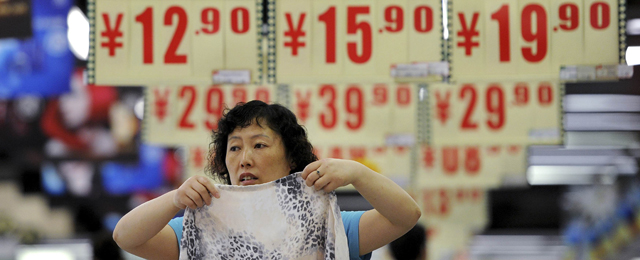It has been reported that the central bank recently took more than 100 billion yuan from the market through targeted repurchase agreements with some financial institutions. This is the first time in six months the regulator has used this tool.
What made it unlike most other past repurchase agreements is that they were undertaken at the request of the financial institutions. In other words, it was not that the central bank wanted to mop up excessive liquidity from the market, but rather financial institutions wanted it to take money from them.
Why? From March, the interbank market has had so much liquidity that the interest rates on short-term loans have been reduced to the lowest levels in more than three years, but not much of the money has gone to the real economy. Recently, the securities and banking regulators have tightened their rules to make it harder for banks to channel funds to the stock market. This means many institutions have had no better investment choice than depositing a huge amount of capital in their account with the central bank. The interest rate on those deposits is a meager 0.72 percent. That makes the repo agreements, which offer an interest rate of more than 2 percent, much more attractive.
In a sense, this use of repurchase agreements shows that the Chinese market is caught in a “liquidity trap.” This term is described in Keynesian economics as a situation where the cost of capital is so low that investors stop responding to further rate cuts. This means an expansionary monetary policy has started to become ineffective. There is so much liquidity it will have no stimulating effect on the economy.
Our current situation is a bit different, of course, from what is described in this theory. China’s real economy still has strong demand for financing, and it is only because it is so hard for companies to get capital that growth has been slow. Because of regulatory restrictions, local governments and real estate developers – which have the most demand for capital – now have problems getting it. Meanwhile, the financial market has struggled to find ways to invest in the real economy, so it has to return some of the capital to the central bank. This may be called a “liquidity trap with Chinese characteristics.”
Its emergence indicates that the market’s liquidity situation has gone past an inflection point. This means the expectation for further expansionary measures will be weakened. Before this, the market may have been anticipating further cuts in interest rates and reserve-requirement ratios, even though the policy had been loose enough, because economic growth has yet to recover. But the emergence of the liquidity trap has made it clear that more liquidity will not help the financial market. This will significantly dampen the market’s hopes for more expansionary moves. So even though the interest rates on short-term interbank loans may remain at low levels, the impact from the change in expectations will gradually become obvious.
It will also prompt the government to shift its focus to total social financing rather than interbank liquidity conditions. Unless the channels through which liquidity can flow to the real economy are cleared, the financial market will continue to be caught in the liquidity trap. To use an expansionary monetary policy to support economic growth, liquidity must flow from the capital market to the real economy. We have seen the central government take measures recently to achieve the goal. The Ministry of Finance sped up a debt-swap plan with local government debt. The National Development and Reform Commission relaxed its regulations to make it easier for local government financing platforms to issue bonds. And the banking regulator is mulling permitting property developers to roll over their bank loans. These measures are all aimed at directing the flow of capital towards the real economy and will reduce the availability of liquidity in the financial market.
This means the financial market will rarely see further liquidity increases. For the A-share market, booming on the strength of cheap capital, this is definitely not good news.
*Xu Gao is Everbright Securities’ chief economist






Be the first to comment on "The ‘liquidity trap’ with Chinese characteristics"